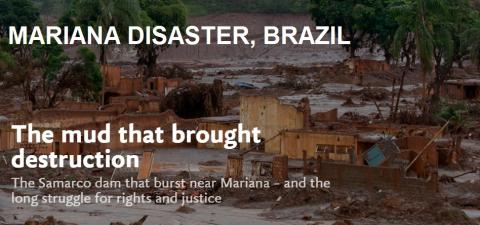
It has been two years since Brazil was hit with the worst environmental disaster in the country’s history when a dam burst at an iron-ore mine and toxic mud swept over villages and into rivers. Known as the Mariana Disaster, it is now the rallying cry for a UN treaty on transnational corporations and human rights. This article, published in the November-December 2017 issue of NewsNotes, includes material produced by CIDSE, an international alliance of Catholic social justice organizations, based in Brussels.
“A disaster of truly epic proportions” is how David Kane, a researcher for the Maryknoll Office for Global Concerns who lives in Brazil, described the situation in an article for NewsNotes soon after a dam burst at a mine near Mariana in the southeastern part of the country on November 5, 2015. “A dam securing a large tailings pond (where undesired rocks, sediment, and chemicals from mining processes are stored) breached, releasing a wall of 62 million cubic meters of toxic mud and water,” Kane wrote. “The avalanche of toxic sludge buried a nearby town and poisoned hundreds of miles of the River Doce which provides water to hundreds of thousands of people. The disaster has exposed the inadequacies of government regulation of mining operations and is part of a global trend of worsening mining disasters.”
To mark the second anniversary of the Mariana Disaster, CIDSE, an international alliance of Catholic social justice organizations (which includes the Maryknoll Office for Global Concerns) has launched a multimedia, story-based website, It offers video footage and photos from the disaster and interviews with the people affected. The concerns go even beyond the people and environment of Brazil to the Atlantic Ocean where the nutrient-rich mouth of the River Doce feeds one of the most important spawning points for fish around the world.
Two years on, affected communities still lack meaningful compensation and remedies for their lost livelihoods. This is not an isolated case. Other communities around the world suffer negative consequences from irresponsible mining and other profit-driven development projects.
Corporate accountability
According to CIDSE, the Mariana Disaster, which began at a mine operated by Samarco, a Vale-BHP Billiton joint venture, is a case study of why transnational corporations (TNCs) need to be held legally accountable. From October 23–27, UN member states met in Geneva to continue negotiations on a UN binding treaty on TNCs with respect to human rights. If successful, the treaty could hold TNCs legally responsible for the impacts of their operations worldwide and provide an avenue to justice for victims of business-related human rights abuses.
This forum was the third and largest to date, with about 100 countries participating. A growing number of states across Latin America, Africa and Asia support the mandate led by Ecuador, while EU states have been reluctant to engage but have taken small steps in this direction. The United States is conspicuously absent, having voted against the resolution in the UN Human Rights Council, which established the mandate in 2014.
The United States reportedly attempted to derail the process on October 27. In an opening statement at an informal (not recorded) session with member states, the U.S. representative said that the UN Secretariat had informed the U.S. that the process could not continue because the current resolution undergirding the treaty was set to expire. Immediately after speaking, the U.S. representative left the room, avoiding questions and comments from other member states, which were many. The UN Secretariat took the floor later and said the very opposite, confirming that no new resolution would be needed to continue negotiations on the treaty.
The United States threatened to leave the UN Human Rights Council in June and has left the post of U.S. Ambassador to the Council vacant. Some interpret the United States’ behavior as an effort to sabotage not only a treaty for corporate accountability but the entire UN human rights body.
Human rights over trade
One component of the treaty is to ensure that human rights obligations override trade and investment rules. Under current rules, the opposite occurs when corporations sue governments for perceived loss of profit and unfair treatment. Companies can use the “investor state dispute settlement mechanism” in private investment courts located in such places as the World Bank in Washington, D.C. The judges are corporate lawyers who, when not presiding, defend parties in front of the same courts. Only companies can bring suits and there is no appeals process.
Considering the harmful impacts of profit-driven development on communities, the treaty will be a critical tool to provide a way for communities to seek justice from transnational corporations.
To learn more about the treaty, read the statement by Archbishop Ivan Jurkovič on behalf of the Holy See and watch short videos by Justice et Paix and of Bishop Alvaro Ramazzini of Guatemala.
